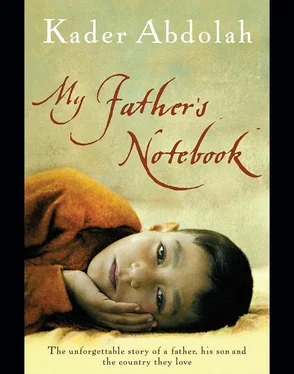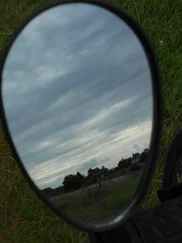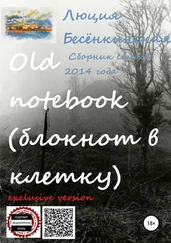“Why?”
“The doctor said that otherwise she’d scream and beat herself over the head again. He gave her an injection. She was acting strangely. I think it had something to do with that airplane. The doctor gave her an injection every day to make her sleep.
“Five days ago I went to the hospital again. I was sitting on the chair beside the bed. Suddenly everybody started running out of the room. Tina opened her eyes and began to scream. I undid the straps, lifted her up, threw her over my shoulder and rushed out into the corridor.
“I found a doctor. Tina was still screaming, so he gave her another injection.
“‘What should I do?’ I gestured to the doctor. ‘Take her home,’ he said and gave me a bottle of pills.
“Outside, people were running away. I carried Tina all the way home.”
“Is she all right now?”
“The wound has healed, but she still won’t wake up and she’s lost weight. I don’t understand it. I think it must have something to do with that airplane, don’t you?”
I started the car and drove to a farm, where my family had been given temporary shelter in the barn. Golden Bell came out just as I was parking the car.
“You found us!” she exclaimed. She held up an oil lamp. I kissed her and followed her inside.
I almost didn’t recognise Tina in the dim light of the oil lamp. I checked the wound and it seemed fine. I couldn’t work out why she was still so sick. Could the bomb have contained some kind of poison?
“Here, this is her medication,” my father signed. He handed me a half-empty bottle of pills.
I looked at the label.
“It’s Valium. How many have you been giving her?”
“Four or five a day,” he replied.
Had the Valium been knocking her out?
“Here, keep the bottle in your pocket. We’re going to stop her medication for a while.”
“Isn’t it any good?”
“I don’t know. Come and help me carry her to the car.”
“Are we taking her to the hospital?”
“No, to Saffron Village. She needs to be in a quiet place, far away from airplanes. I’ll stay with you for a couple of days. If she doesn’t get any better, I’ll take her to Tehran.”
The sun was just coming up as we drove into Saffron Village. We went to our summer house, the one my father had built in the time of Reza Shah. I hadn’t been there for years, but Tina and my sisters often spent the summer there.
“Golden Bell, will you make Tina some soup? I’ll make the tea. And Father, will you go and get some fresh bread? I’m starving! Are you hungry, too, Golden Bell?”
My sister Golden Bell — the best, the prettiest, the sweetest sister in all the world — walked with such a cheerful bounce that I suddenly felt optimistic. Surely hope, health and happiness were on their way to our summer house! She picked up a basket and went off with my father to get some vegetables.
Tina lay like a corpse in bed. But all the signs — my burst of optimism, Golden Bell’s cheerfulness, the light in my father’s eyes, even the birds singing in the garden — pointed to Tina’s recovery. Soon she would open her eyes and look around quietly, without screaming.
Suddenly I saw a white rabbit. We didn’t have white rabbits in our part of the country, but there it was, sitting outside our door. It hopped around for a while, quite merry, then disappeared.
Now I was sure that things would soon be all right.
The next day, when a fire was blazing in the stove and the soup was bubbling away, my father gestured, “Look! Tina’s trying to open her eyes.”
I stayed for five days, days filled with the smell of soup, milk, fresh bread and burning logs.
We took care of Tina and walked around the hills, laughing at the antics of a little white rabbit.
Those days, too, came to an end.
Let’s climb to the roof of our country
and pray .

One night dozens of Iraqi airplanes appeared above Tehran and bombed the city for the umpteenth time. It was the heaviest bombardment to date.
Radio Baghdad regularly issued warnings that warplanes were going to bomb Tehran. The broadcasters also urged people to leave the city, so twelve million inhabitants took to their heels. Sometimes the planes came, sometimes they didn’t. Saddam Hussein played the same game over and over again. People no longer knew whether to stay or go.
If you grabbed your children and fled, the planes didn’t come, but if you stayed, the city was bombed. It was psychological warfare. When the planes did come, the nights were hell. They flew over the city with a terrifying roar. Your house shook, pictures fell from the walls, pots and pans bounced off the shelves, the cat crept under the covers, the baby cried and the bombs thudded to the ground, accompanied by the rattle of anti-aircraft guns. The all-clear finally sounded, only to be followed by the shriek of fire engines and ambulances. You’d rush outside to see which houses had been hit.
But that night, when dozens of planes bombed Tehran simultaneously, killing and injuring hundreds, Khomeini took advantage of the chaos. He ordered his secret police to arrest the leaders of the leftist opposition. For years they’d been pinpointing hiding places, so even before the Iraqi planes had finished, most of the important party leaders had been rounded up.
In the morning, on my way to an editorial meeting, I ran into one of my fellow editors. “We’ve got to get out of here fast. Almost all of the leaders have been arrested.”
It meant the end of the party. I immediately went back to my flat to warn my wife, Safa, who took our daughter, Nilufar, to her grandmother’s house in Kermanshah. Then I destroyed whatever documents were in my possession. After that, all I could do was wait.
So far I’ve said very little about Safa. That’s because I don’t want to stray from my father’s cuneiform notebook. Otherwise I would also have written more about my sisters and about their husbands’ tragic fate.
I met Safa at the university. She sympathised with the party, although she wasn’t a member. She hadn’t been the one to seek contact. If we hadn’t met, she probably would have led a normal life, but because of me, she got involved in all kinds of underground activities.
Until the revolution broke out, we met in secret. We knew that every rendezvous might be our last. The revolution made it easier for us to get together and we gradually dared to talk about the future.
The day after the fall of the shah, I had a date with Safa. I asked her to marry me.
Our wedding was a simple affair: just two of our friends who acted as witnesses and the civil servant who performed the ceremony. In such momentous times, when we were all so busy, a wedding banquet was out of the question. We celebrated our wedding in a café, talking with our comrades deep into the night.
Three weeks later I took Safa to meet my parents.
“This is my wife.”
“Really?” cried Tina. “She’s beautiful.”
My sisters, surprised at this unexpected turn of events, embraced Safa. My father kept his distance. He knew I had a girlfriend, because I’d shown him a picture of Safa. In his eyes, however, the bride’s health was of prime importance in a marriage. He scrutinised her from head to toe.
Not only did she appear to be healthy, she was also vivacious and sociable. I could see the approval in his eyes. Safa walked over to him and embraced him. And because she knew the story of his first wife’s death, she took his hand and held it to her cheek. “See,” she said, “I’m healthy.”
What else? I can’t imagine that my father would have written more about his first meeting with Safa.
Читать дальше













